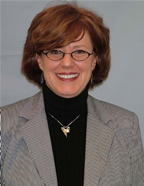Nancy Pelaez Named to National Science Foundation
Pelaez will serve as Program Director within the Education Division
January 2, 2007
By Debra Cano Ramos
Nancy Pelaez, associate professor of biological science, has temporarily traded her Cal State Fullerton classroom for an appointment at the National Science Foundation in Arlington, Va.
Pelaez, who called it an honor to have been afforded the opportunity, is a program director for the NSF’s Division of Undergraduate Education.
“The position gives me the chance to help the federal government make decisions — and in the process, I learn who has a voice when federal government decisions are made and what the government does to benefit institutions like CSUF and students like those in our community,” she said.
In 1950, Congress established the National Science Foundation “to promote the progress of science; to advance the national health, prosperity and welfare; and to secure the national defense. …With an annual budget of about $5.58 billion (fiscal year 2006), NSF funds the people, ideas and tools to boost U.S. leadership in all aspects of science, mathematics and engineering research and education.”
Serving as a rotating program officer at the National Science Foundation is a privilege bestowed on only a few faculty members at U.S. colleges and universities, noted Steve Murray, dean of the College of Natural Sciences and Mathematics and professor of biological science.
“Working with leading scientists throughout the country, these officers are exposed to the best scientific thinking,” Murray said, adding that their funding decisions play important roles in developing new directions in scientific research.
“Dr. Pelaez’s work at NSF brings visibility to Cal State Fullerton and the knowledge and experience that she gains will be of great value to the university and to our students,” he said.
Pelaez started her 12-month stint in August 2006. Despite the long-distance move to take the role, she continues to work with CSUF graduate students, returning to campus as needed to discus thesis projects and related studies. She guides research projects for educators in the master of arts in teaching science degree program and teaches physiology, as well as biology, for pre-service teachers.
Her NSF work has involved managing grants for undergraduate education. So far, she has doled out $1 million in grants to college science faculty at institutions across the country.
“My job is to gather expert panelists who are qualified to review [grant] proposals that request funding for projects to innovate and improve science education at the undergraduate level,” she said.
She also has represented NSF and universities at meetings, such as at the fall convocation on “Rising Above The Gathering Storm: Energizing and Employing America for a Brighter Economic Future,” held at the National Academies. To better learn about higher-education science teaching needs, she travels to meet with college science faculty at institutions nationwide.
In addition, Pelaez is responsible for the NSF’s National Science, Technology, Engineering and Mathematics Education Digital Library (NSDL) program. This program’s goal of establishing a national digital library is already beginning to provide an online network of learning environments and resources for science, technology, engineering and mathematics (STEM) education at all levels.
Before joining CSUF in 1999, Pelaez taught biology and chemistry for 10 years in Bogotá, Colombia, and three years at Indianapolis public schools. In South America, she coordinated the K-12 science scope and sequence for a school that served as a test site for the Biological Sciences Curriculum Study (BSCS) middle school project, “Science and Technology: Investigating Human Dimensions.”
The program, published by Kendall/Hunt Publishing Co., promotes the development of the early adolescent with strategies to encourage the participation of female, minority and handicapped students, with an emphasis on reasoning and critical thinking skills. Several Cal State Fullerton graduate students have seen improvements from using the BSCS materials with lower-scoring students, Pelaez said.
Pelaez earned her bachelor’s degree in biology from Newcomb College-Tulane University in New Orleans, California single-subject teaching credentials in life science and physical science from Mills College in Oakland, and her doctorate in physiology and biophysics, with a research focus on vascular muscle physiology, from Indiana University School of Medicine. Her doctoral research was supported by a Howard Hughes Medical Institute fellowship.
She is secretary for the teaching section of the American Physiological Society and is a founding member and associate editor on the MERLOT Teacher Education Editorial Board.

